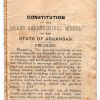calsfoundation@cals.org
Jerome Bill Becker (1924–1997)
Jerome Bill Becker served as president of the Arkansas American Federation of Labor and Congress of Industrial Organizations (AFL-CIO) from 1964 to 1996. At the time of his death, Becker was noted as the longest-serving state AFL-CIO president in the United States.
J. Bill Becker was born on February 25, 1924, in Chicago, Illinois. His parents, Joseph and Hazel Becker, were Russian immigrants. In 1942, Becker graduated in the upper third of his class from John Marshall High School in Chicago, where he was a standout football player. Becker suffered a knee injury while playing high school football, which initially made him ineligible to serve in the U.S. armed forces during World War II. Instead, he worked at a defense plant for sixty hours per week and also attended college. However, Becker apparently recovered from his knee problems, and after the war was over, he entered the U.S. Army. After he was discharged, he qualified for the G.I. Bill, which paid for the rest of his college education.
Becker graduated from the University of Illinois at Urbana-Champaign in 1949 with a BS in economics. His career in union work began with the Amalgamated Clothing Workers of America (ACWA), where he spent most of his time organizing labor unions. He also had experience in strikes and picket line work. Becker was employed by the ACWA for nine years and by the Amalgamated Meat Cutters Union for two years. As a union organizer, he worked primarily in Arkansas, Missouri, Kentucky, Oklahoma, Louisiana and Ohio.
Becker’s father, a union member, worked for many years as a cutter in the men’s clothing industry. Becker too was related to the garment industry, organizing its labor unions.
In 1956, Becker became a charter member of the Arkansas AFL-CIO. According to an AFL-CIO brochure that was distributed at Becker’s 1997 retirement party, “Arkansas is the first state to merge its American Federation of Labor and the Congress of Industrial Organizations into a unified AFL-CIO. J. Bill Becker is one of those who signs the charter. He also serves on the First Executive Board of the State Federation.”
Becker was elected secretary-treasurer of the Arkansas AFL-CIO in 1960 and served in that capacity until 1964. In 1964, George H. Ellison, president of the Arkansas AFL-CIO, took another position with a national union, and Becker was chosen by the executive board of the AFL-CIO to fill Ellison’s unexpired term. In 1965, Becker was elected to his first two-year term as president, and he remained president until 1996.
As head of the Arkansas AFL-CIO, Becker had a major impact on Arkansas politics, and many in political office sought his endorsement. Becker was quoted by the Arkansas Democrat-Gazette as saying, “People try to argue the numbers [meaning, the numbers of AFL-CIO union members in Arkansas], but our endorsement was important enough for every governor to try to get.”
In 1968, the Arkansas General Assembly passed Arkansas’s first minimum-wage bill, a major goal of the Arkansas AFL-CIO. In a special session of the Arkansas General Assembly, Senate Bill 61 became Act 25 of 1968. It was signed into law on February 19, 1968, and took effect on January 1, 1969. At the signing ceremony at the Arkansas State Capitol, Becker was prominently seated to the right of Governor Winthrop Rockefeller. Odell Smith, president of Teamsters Local 878, was seated to the left of Rockefeller. According to the Arkansas Gazette, “J. Bill Becker of Little Rock, president of the state AFL-CIO, said that passage of the bill indicated to him that ‘labor has reached maturity in Arkansas.’”
Becker strongly believed in the union cause, and on several occasions, he clashed with Arkansas governors when he thought they were not supportive of labor. In August 1975, city firefighters employed by Pine Bluff (Jefferson County) went on strike, and Governor David Pryor called out the Arkansas National Guard to provide firefighters for the city. Replacement workers were hired, and the guardsmen left by September 16. This situation created a public breach between Pryor and the AFL-CIO, which had previously supported Pryor.
Becker’s rifts with Governor Bill Clinton are well known. When Clinton was running for president in 1992, Becker issued a report that said Clinton supported labor less than thirty percent of the time. In March 1992, the New York Times quoted Becker as saying, “Bill Clinton is mainly the friend of big business.” However, when the national AFL-CIO endorsed Clinton, Becker seconded the motion for endorsement.
In June 1996, Becker lost his office as president of the Arkansas AFL-CIO to Alan Hughes; Becker received 17,246 votes to Hughes’s 21,585. A retirement dinner was held in Becker’s honor on August 16, 1997. For the occasion, the Arkansas AFL-CIO created a thirty-page brochure that chronicled Becker’s career, as well as words of thanks from unions throughout Arkansas and across the country.
Becker died on December 6, 1997, at St. Vincent Infirmary in Little Rock (Pulaski County). He was survived by his wife, Mary; his five children; and six grandchildren.
For additional information:
“Arkansas Labor Wins at Polls in Workmen’s Compensation Fight.” AFL-CIO News, November 16, 1968, p. 1.
“Becker among Famed Arkansans Who Died in ’97.” Arkansas Democrat-Gazette, December 28, 1997, p. 3B.
“J. Bill Becker Calls It a Lifetime.” Arkansas Democrat-Gazette, December 11, 1997, p. 9B.
J. Bill Becker Collection (M16-01). University of Central Arkansas Archives and Special Collections, Conway, Arkansas.
Oman, Noel E. “Becker Dies at 73; Considered Labor’s Fearless Advocate.” Arkansas Democrat-Gazette, December 7, 1997, pp. 1B, 10B.
“Unions Are Split on Backing Clinton.” New York Times, March 15, 1992, p. 26.
Jimmy Bryant
University of Central Arkansas






Comments
No comments on this entry yet.